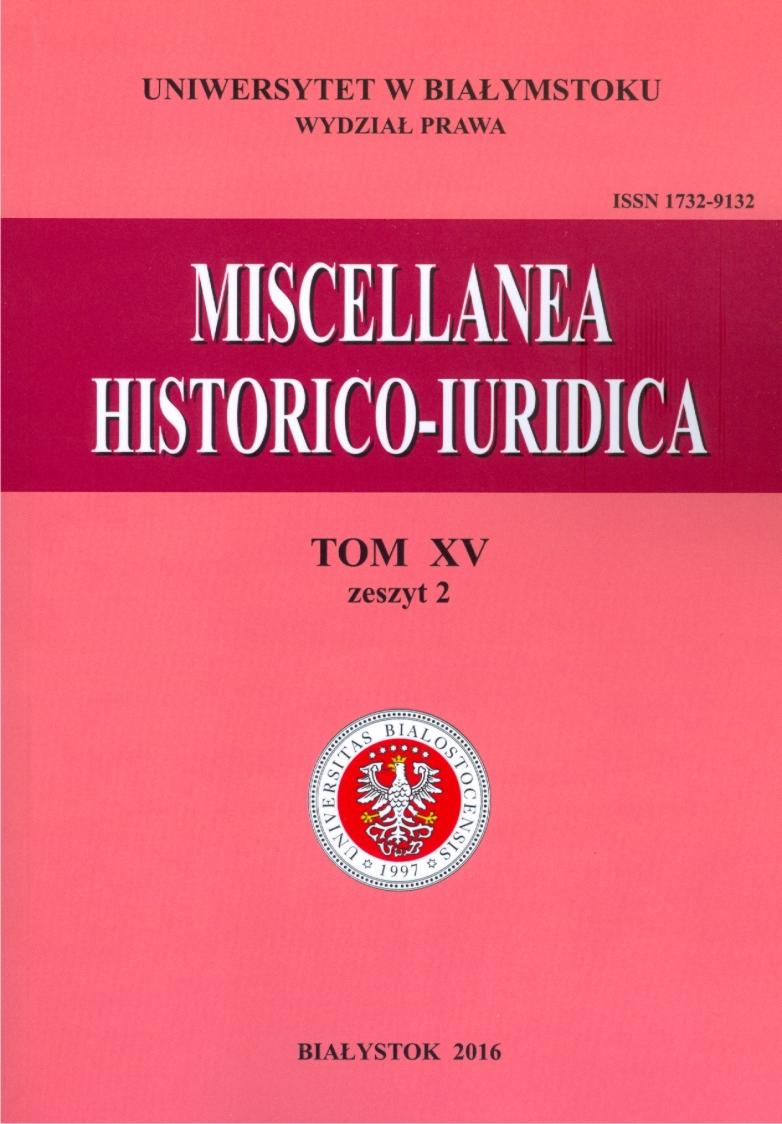Culture built with words. A few points on connections of political-legal thought with classical rhetoric
Keywords:
political and legal culture, political-legal doctrines, classical rhetoric, educationAbstract
The essence of European political-legal culture should be searched at its source, which stems from the practice of political-legal thought during the Greco-Roman period. A particular example of the cultural development process, including political and legal culture, is classical rhetoric. Bearing this in mind, the aim of the article is to point out the connections between classical rhetoric and political-legal thought. The intention of the author is to draw the readers’ attention to four selected connections described as: objective, subjective, purposive and didactic. Objective connections are based on the assumption of common interests of rhetoric and the history of political-legal doctrines, related to the issues of law, authority and state. Subjective connections are the results of the fact that classical rhetoricians are simultaneously the creators of political-legal doctrines, and they are also those who contributed to the development of rhetoric art. The text of the article also points out the purposive connections between rhetoric and political-legal thought. They are the outcome of the mutual creation of political and legal culture, by referring to the idea of the good of the state or institutional and legal issues. In addition the article illustrates the merits of increasing the role of the issues related to rhetoric when teaching the history of political-legal doctrines.
References
Arendt H., Polityka jako obietnica, Warszawa 2005.
Arystoteles, Retoryka, Warszawa 2008.
Chmielowska L., Filozofia polityczna Sokratesa, „Prace Naukowe Akademii im. Jana Długosza w Częstochowie, Seria: Res Politicae” 2009, t. 3.
Cichocka H., Z recepcji Retoryki Arystotelesa w Bizancjum, „Peitho/Examina Antiqua” 2012, nr 1.
Cyceron M.T., Wybór pism naukowych, Warszawa 2002.
Cyceron M.T., O inwencji retorycznej, Warszawa 2013.
Demostenes, Wybór mów, Wrocław 2005.
Dubel L., Historia doktryn politycznych i prawnych do schyłku XX wieku, Warszawa 2009.
Gorgiasz, Pochwała Heleny, „Przegląd Humanistyczny” 1984, nr 3.
Hansen M.H., Demokracja ateńska w czasach Demostenesa, Warszawa 1999.
Homer, Iliada, Wrocław 2004.
Kelly J.M., Historia zachodniej teorii prawa, Kraków 2006.
Kwintylian, Kształcenie mówcy, Warszawa 2002.
Lichański J.Z., Jak Kwintylian rozumiał retorykę: zapomniana definicja, „Forum Artis Rhetoricae”2012.
Maneli M., Historia doktryn polityczno-prawnych. Starożytność, Warszawa 1961.
Maroń G., Instytucja ślubowania sędziowskiego w polskim porządku prawnym, „Studia Prawnicze” 2011, nr 3-4.
Marzęda W., Retoryka jako forma krytycyzmu, „Czasopismo Filozoficzne” 2007, nr 2.
Meier Ch., Powstanie polityczności u Greków, Warszawa 2012.
Meyer M., Carrilho M., Timmermans B., Historia retoryki od Greków do dziś, Warszawa 2010.
Między znaczeniem a działaniem. Retoryka i władza, red. A. Kampka, Warszawa 2012.
Nerczuk Z., Pochwała Heleny Gorgiasza z Leontinoi, „Studia Antyczne i Mediewistyczne” 2012, nr 10.
Nerczuk Z., Sztuka a prawda. Problem sztuki w dyskusji między Gorgiaszem a Platonem, Wrocław 2002.
Nieć M., Komunikowanie polityczne w społeczeństwach przedmasowych, Warszawa 2011.
Nowaszczuk J., Kompozycja wypowiedzi w ujęciu greckiej szkoły retorycznej, „Roczniki Humanistyczne” 2006-2007.
Perelman Ch., Imperium retoryki. Retoryka i argumentacja, Warszawa 2002.
Platon, Dialogi, t. 1, 2, Kęty 1999.
Schopenhauer A., Sztuka prowadzenia sporów, Warszawa 2003.
Tokarczyk R., Współczesne kultury prawne, Warszawa 2010.
Tukidydes, Wojna peloponeska, t. 1, Wrocław 2004.
Tuszyńska-Maciejewska K., Platon a retoryka. Od krytyki do modelu, Poznań 1996.
Wołpiuk W.J., Kultura prawna z perspektywy dystynkcji między cywilizacją a kulturą, „Gdańskie Studia Prawnicze” 2014, t. XXXI.







